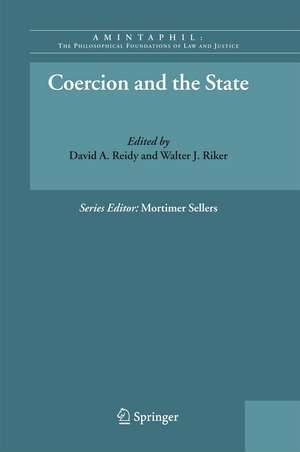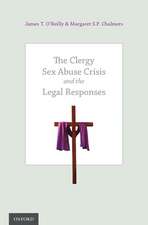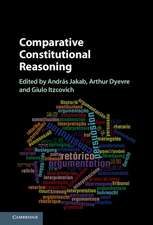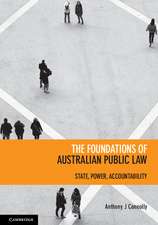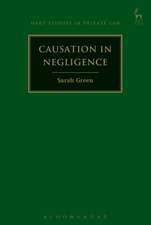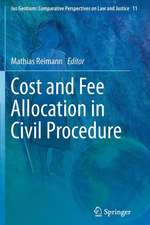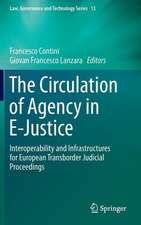Coercion and the State: AMINTAPHIL: The Philosophical Foundations of Law and Justice, cartea 2
Editat de David A. Reidy, Walter J. Rikeren Limba Engleză Hardback – 26 mar 2008
| Toate formatele și edițiile | Preț | Express |
|---|---|---|
| Paperback (1) | 639.25 lei 6-8 săpt. | |
| SPRINGER NETHERLANDS – 20 noi 2010 | 639.25 lei 6-8 săpt. | |
| Hardback (1) | 645.47 lei 6-8 săpt. | |
| SPRINGER NETHERLANDS – 26 mar 2008 | 645.47 lei 6-8 săpt. |
Preț: 645.47 lei
Preț vechi: 759.37 lei
-15% Nou
Puncte Express: 968
Preț estimativ în valută:
123.51€ • 128.95$ • 102.22£
123.51€ • 128.95$ • 102.22£
Carte tipărită la comandă
Livrare economică 05-19 aprilie
Preluare comenzi: 021 569.72.76
Specificații
ISBN-13: 9781402068782
ISBN-10: 1402068786
Pagini: 272
Ilustrații: XI, 259 p.
Dimensiuni: 155 x 235 x 30 mm
Greutate: 0.56 kg
Ediția:2008
Editura: SPRINGER NETHERLANDS
Colecția Springer
Seria AMINTAPHIL: The Philosophical Foundations of Law and Justice
Locul publicării:Dordrecht, Netherlands
ISBN-10: 1402068786
Pagini: 272
Ilustrații: XI, 259 p.
Dimensiuni: 155 x 235 x 30 mm
Greutate: 0.56 kg
Ediția:2008
Editura: SPRINGER NETHERLANDS
Colecția Springer
Seria AMINTAPHIL: The Philosophical Foundations of Law and Justice
Locul publicării:Dordrecht, Netherlands
Public țintă
ResearchCuprins
What is Coercion?.- How Did There Come To Be Two Kinds of Coercion?.- On Coercion.- Undue Influence as Coercive Offers in Clinical Trials.- Coercion and the State: Justification and Limits.- Coercion, Justice, and Democracy.- Democratic Legitimacy and the Reasoned Will of the People.- John Brown's Duties: Obligation, Violence, and ‘Natural Duty’.- Coercion and the State: Legal Powers and Status.- Coercion, Neutrality, and Same-Sex Marriage.- The Cheshire Cat: Same-Sex Marriage, Religion, and Coercion by Exclusion.- Coercion and the State: National Security.- Indefinite Detention for Mega-Terrorists?.- The Great Right: Habeas Corpus.- Coercion and the International Order.- Coercion Abroad for the Protection of Rights.- Transnational Power, Coercion, and Democracy.- A Developmental Approach to the Legitimacy of Global Governance Institutions.- Global Economic Justice, Partiality, and Coercion.- International and Cosmopolitan Political Obligations.
Textul de pe ultima copertă
A signal feature of legal and political institutions is that they exercise coercive power. The essays in this volume examine institutional coercion with the aim of trying to understand its nature, justification and limits. Included are essays that take a fresh look at perennial questions – what, if anything, can legitimate state exercises of coercive force? What is coercion in politics and law? – and essays that take a first or nearly first look at newer questions – may the state coercively hold certain terrorists indefinitely? Does the state coerce those seeking to join in same-sex marriage when it refuses to extend legal recognition to same-sex marriage? Can there be a just international order without some agency possessed of the final and rightful authority to coerce states? Leading scholars from philosophy, political science and law examine these and related questions shedding new light on an apparently inescapable feature of political and legal life: Coercion.
"The topic of coercion stands among the foundational concepts of political and legal philosophy, yet it is rarely scrutinized. This volume fills in the gap by providing an in-depth discussion of the nature and justification of coercion in matters ranging from state authority and democratic legitimacy to national security and human rights. Authored by an impressive group of philosophers and legal theorists, the chapters explore these vital issues from a wide variety of perspectives, with admirable clarity and sharply contested arguments. The book constitutes an important contribution to our understanding of the normative and institutional issues of coercion in both the domestic and international order."
Deen Chatterjee, University of Utah
"The topic of coercion stands among the foundational concepts of political and legal philosophy, yet it is rarely scrutinized. This volume fills in the gap by providing an in-depth discussion of the nature and justification of coercion in matters ranging from state authority and democratic legitimacy to national security and human rights. Authored by an impressive group of philosophers and legal theorists, the chapters explore these vital issues from a wide variety of perspectives, with admirable clarity and sharply contested arguments. The book constitutes an important contribution to our understanding of the normative and institutional issues of coercion in both the domestic and international order."
Deen Chatterjee, University of Utah
